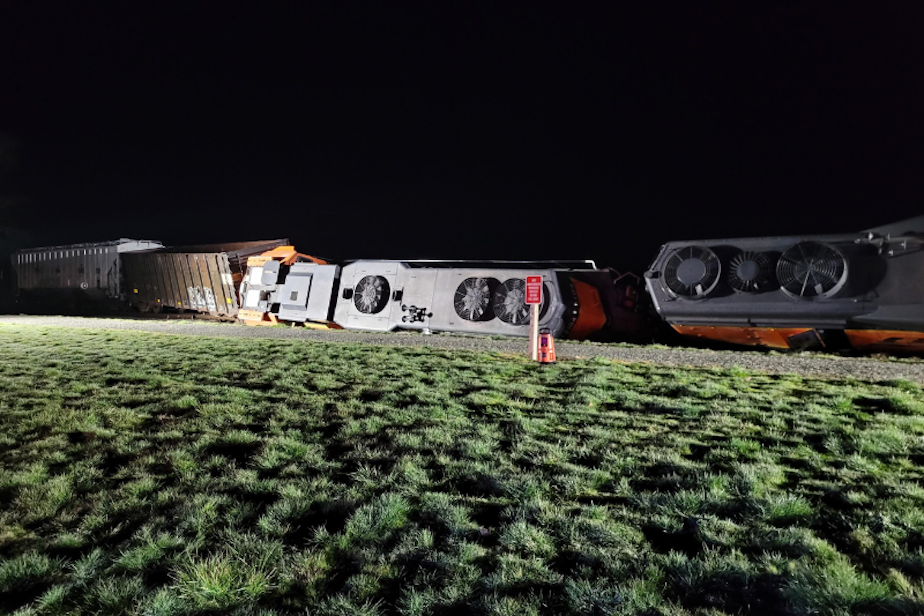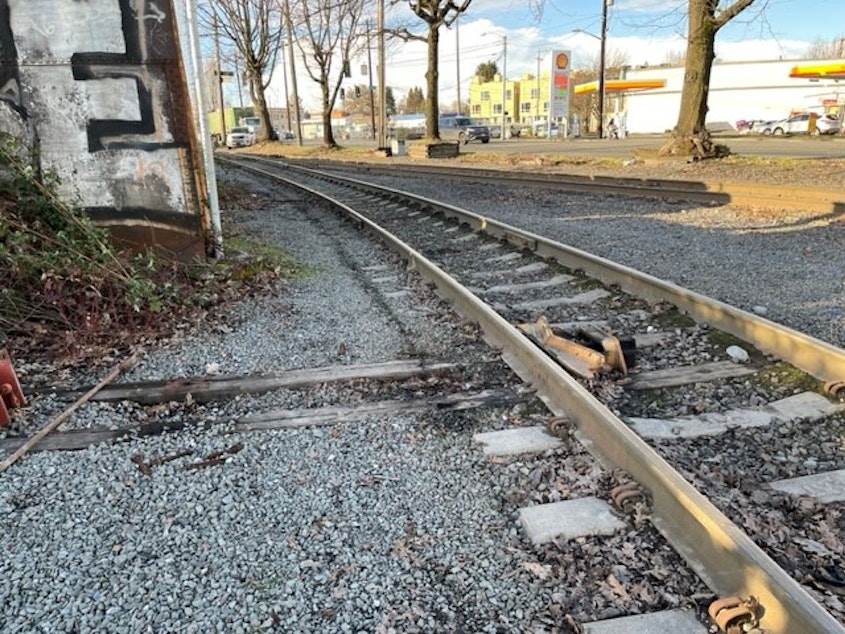Oil train derailed to avoid plunging into Puget Sound, tribal leader says

Cleanup continued Friday after an overturned BNSF Railway train spilled diesel fuel on the Swinomish Reservation near Anacortes, about 50 miles north of Seattle.
By Friday afternoon, crews had excavated 1,200 cubic yards of soil — enough to fill about 100 dump trucks — and pumped out 3,000 gallons of diesel-contaminated groundwater.
Why the BNSF train derailed behind the Swinomish Casino and Lodge early Thursday morning is under state and federal investigation.
When it went off the rails just after midnight, the short, seven-car train was approaching a swing bridge over the Swinomish Channel after leaving one of the two oil refineries in Anacortes. No government or industry officials contacted by KUOW would disclose which refinery.
The 11-mile-long waterway, a shallow arm of Puget Sound, separates Fidalgo Island — home to Anacortes and the HollyFrontier and Marathon refineries — from the Skagit County mainland.
While the track conditions and equipment where the train derailed are unclear, railroad bridges often have a safety device called a derailer on the tracks.
Sponsored
When deployed, it forces a train’s wheels to jump the tracks and serves to abruptly stop a train from going where it shouldn’t.
The rotating bridge over the Swinomish Channel is kept open most of the time for boats to pass through.
“Apparently, it wasn't in position for the train to move on. So it derailed the train like it's supposed to,” said Samish Indian Nation chair Tom Wooten.
Wooten is the elected leader of the Samish Nation, a federally recognized tribe that is based in Anacortes, but has no reservation, and a retired employee of the Shell (now HollyFrontier) refinery in Anacortes.
He visited the incident command set up at the spill site Thursday morning.
Sponsored
Wooten said he requested a briefing from incident commanders and was told how the derailer device had pushed the train off the rails.

“It did what it was supposed to and spilled the train off the tracks so it wouldn't continue on into the Swinomish Slough, into the water, which wouldn't have been good at all.”
The two locomotives fell on their sides, while the buffer car behind them partially derailed, and the four tanker cars behind them stayed upright on the tracks.
Sponsored
No injuries were reported in the Anacortes train wreck.
“We're thankful that no one got injured,” Wooten said. “And the fuel that was spilled didn't make it to the water, right, to the Salish Sea. So we're thankful about that.”
KUOW has been unable to confirm Wooten’s account of how the train derailed with BNSF or the state and federal agencies in the incident command.
Spokespeople for the Washington Department of Ecology and the U.S. Environmental Protection Agency declined to comment on what led to the locomotives jumping the tracks.
“We’re just directing the cleanup. I can’t give you anything on what happened and why,” said U.S. Environmental Protection Agency spokesperson Bill Dunbar.
Sponsored
A spokesperson for the Washington Utilities and Transportation Commission, which is investigating the crash’s causes with the Federal Railroad Administration, referred an interview request to the federal agency, which did not respond.
BNSF spokesperson Lena Kent did not respond to an email requesting comment.
The National Transportation Safety Board is not investigating this crash.
“The NTSB has does not have the resources to investigate each of the thousands of rail accidents in the country each year,” National Transportation Safety Board spokesperson Sarah Taylor Sulick said in an email.
She said this crash was not as severe as the ones the agency typically investigates.
Sponsored
Nationwide, human error and poor track conditions are the leading causes of rail accidents, according to Federal Railroad Administration data.
An engineer and a conductor were aboard the BNSF train Thursday morning.
“I know the engineer was a very experienced engineer,” said Herb Krohn with the International Association of Sheet Metal, Air, Rail and Transportation Workers. “Many years of experience.”
In August, a Union Pacific train was traveling in a railyard in El Paso, Texas, at 9 miles per hour when it hit a portable derailer installed to protect workers making track repairs. The locomotive flipped over, killing the Union Pacific conductor, 49-year-old Mario Navarro.
Emergency officials estimate that 2,000 cubic yards of diesel-contaminated soil might need to be removed from the Swinomish spill site before rebuilding the waterfront railroad track. Crews plan to install groundwater wells to check for any diesel migrating from the site and have already placed absorbent boom along the shoreline, though officials said no diesel has reached the shoreline and there is no evidence of any damage to wildlife.
“We know that things could have been much, much worse,” Swinomish Indian Tribal Community chair Steve Edwards said in a press release. “We at Swinomish will continue to do everything we can to protect the waters and natural resources around us, while ensuring public safety.”
The railroad track was built on the Swinomish Reservation, over the tribe’s objections, back in 1889.
Many legal battles later, the Swinomish Tribe argues that BNSF needs to pay for hauling more oil than it is allowed to.
The tribe sued the nation’s largest rail company in 2015 to "disgorge" the profits it has made shipping large volumes of crude oil across the reservation in mile-long trains.
"Disgorgement" is the legal term for coughing up profits obtained illegally.
A federal judge previously ruled that BNSF intentionally trespassed on the Swinomish reservation by running trains four times longer than an agreement with the tribe allows: one train of up to 25 cars per day in each direction.
On Monday, the two sides are scheduled to meet again in federal court in Seattle.
The big question for this week’s hearing is whether BNSF thought it had no choice but to violate its agreement with the Swinomish.
Under federal law, rail companies are “common carriers,” required to provide reasonable freight transportation upon request.
Hundred-car trains have been carrying Bakken crude oil from North Dakota across the Swinomish Reservation since the Anacortes refineries first requested that service of BNSF in 2012.
Disclosure: BNSF Railway was a financial supporter of KUOW in 2021. A previous version of this disclosure incorrectly stated that BNSF is currently a financial supporter.




